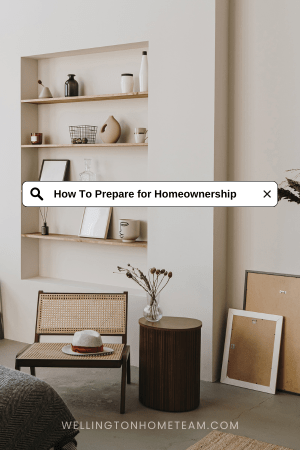Helpful Tips for Transitioning from Renting To Homeownership
Transitioning from being a renter to a homeowner is an exciting milestone, but it also comes with new responsibilities and challenges. For many, owning a home is a testament to years of hard work and financial discipline. While the shift from renting to homeownership may seem daunting, it doesn’t have to be overwhelming. This article aims to guide first-time buyers through the process, offering the information and support needed to make the journey to homeownership smoother and more manageable.

Financial Implications: Renting vs. Homeownership
Transitioning from renting to homeownership is one of the most significant financial changes a person can experience. As a renter, expenses are usually straightforward and predictable, consisting primarily of monthly rent and, in some cases, utility bills. However, homeownership introduces a range of additional financial responsibilities. Beyond the mortgage payments, homeowners must account for property taxes, homeowner’s insurance, and maintenance costs, all of which contribute to an increased financial commitment.
It is therefore important to gain an understanding on these factors. A complete comparison of the financial implications of both could look something like this:
- The rationality of paying a fixed rental amount while the unpredictability of home maintenance costs.
- The probability of a rent raise or the fixed mortgage rate.
- The distinguishing factors of the landlord’s obligation to make repairs as well as duties of the homeowner.
Getting Your Finances in Order
The first step in the homeownership process is ensuring that your finances are prepared for this major commitment. It’s not just about saving for the down payment and purchase price; you also need to budget for additional expenses like closing costs, moving fees, potential immediate repairs, and unexpected home emergencies.
Equally important is maintaining a strong credit score, as it directly affects your mortgage terms, including interest rates. In general, the higher your credit score, the more favorable the mortgage rates and terms you’ll receive.
Exploring Financing Options
Once you have your finances in order, the next step is to explore your financing options. Before submitting an offer on a home, you’ll need to decide on the loan program that best suits your needs, as this information must be included in your offer along with the down payment amount.
Standard variable rate mortgages are among the most common and straightforward options, but they aren’t the only ones available. Government-sponsored programs like FHA and USDA loans can be excellent choices for those who may not qualify for conventional loans. Additionally, credit unions and local or state programs specifically designed for first-time buyers can offer valuable opportunities.
Each financing option comes with its own set of prerequisites, advantages, and disadvantages. Consulting with a mortgage broker and financial planner can help you navigate these choices and determine which program aligns best with your financial situation and homeownership goals.
Finding Your Perfect Home
Finding the perfect home is an exciting step once you have your loan pre-approved. This phase involves a combination of research and exploration to find a property that aligns with your needs and preferences.
Begin your home search by understanding the current market conditions. Determine whether it’s a seller’s market, a buyer’s market, or a stable market.
- Seller’s Market: In this scenario, demand exceeds supply, leading to higher prices and more competition. Homes sell quickly, often at or above asking price. In a seller’s market, you might need to act swiftly and be prepared to make competitive offers.
- Buyer’s Market: Here, supply exceeds demand, resulting in lower prices and more negotiating power for buyers. You’ll likely find more options and have the opportunity to negotiate terms more favorably.
- Stable Market: This is a balanced market where supply and demand are relatively even, leading to stable home prices. In this type of market, buyers and sellers have a more equitable playing field.
Once you understand the market conditions, focus on identifying areas that align with your criteria. As you evaluate potential homes, you’ll want to keep the following key factors in mind:
- Location and Connectivity: Consider the home’s proximity to work, schools, public transportation, and other amenities. Easy access to major roads and public transit can significantly impact your daily life.
- Neighborhood and Community: Assess the overall vibe of the neighborhood and whether it suits your lifestyle. Look into the community’s safety, services, and any future developments that might affect your living experience.
- Condition of the Property: Inspect the property thoroughly for any signs of damage or needed repairs. Pay attention to the condition of essential systems like plumbing, electrical, and HVAC, as well as the general upkeep of the home.
- Price of the Property: Ensure that the asking price fits within your budget and aligns with the current market value. Factor in additional costs such as property taxes, insurance, and potential homeowners association (HOA) fees.
- Potential for Future Expansion or Modification: Consider whether the property has room for future changes or improvements if needed. This includes evaluating the size of the lot, zoning regulations, and any restrictions that might impact your ability to make modifications.
By keeping these factors in mind, you can make a more informed decision and find a home that fits both your immediate needs and long-term goals.
Embracing Rent-To-Own Options
For those who need time to save money or improve their credit rating, rent-to-own agreements offer a valuable pathway to homeownership. This option allows you to rent a property for a specified period with the intention of purchasing it at the end of the rental term.
Rent-to-own arrangements provide the opportunity to live in the home while working on your financial readiness. It also gives you the chance to test out the property and the neighborhood before committing to a purchase.
If you’re considering a rent-to-own option, it’s essential to understand the terms of the agreement thoroughly. For a detailed overview, check out a rent-to-own template, which can help you navigate and comprehend the specifics of such agreements.
Gearing Up for Homeownership Responsibilities
 As you prepare and go from renting to homeownership, it’s important to understand that it comes with a range of responsibilities. Unlike renting, where maintenance tasks are often handled by a landlord, owning a home means you’ll be in charge of a variety of tasks. This includes routine upkeep, such as changing out AC filters, mowing the lawn, and handling unexpected repairs.
As you prepare and go from renting to homeownership, it’s important to understand that it comes with a range of responsibilities. Unlike renting, where maintenance tasks are often handled by a landlord, owning a home means you’ll be in charge of a variety of tasks. This includes routine upkeep, such as changing out AC filters, mowing the lawn, and handling unexpected repairs.
While these responsibilities may seem daunting at first, they also offer you the freedom to make your home truly your own. From customizing the space to suit your personal taste to managing your property as you see fit, homeownership gives you the opportunity to create a living environment that reflects your needs and wants.
Being prepared for these responsibilities means not only budgeting for regular maintenance and repairs but also making sure you have the time to address them. If you don’t have the time it’s important to budget for someone else to tackle them for you.
Closing the Deal
The final step in your transition from renting to homeownership is getting to the closing table and closing on the home. Once you’ve found a home you love, made an offer, and had it accepted you’ll move onto the next steps. These steps usually include;
- Home Inspection: Schedule a home inspection to identify any potential issues or hidden deficiencies. This step is crucial for uncovering problems that might need addressing before you complete the purchase.
- Home Appraisal: An appraisal is conducted to verify the home’s value. This ensures that the price you’re paying is fair and in line with the market.
- Final Walkthrough: Take one last walkthrough of the property to confirm that no significant changes or issues have arisen since your previous visit. This is your opportunity to ensure the home is in the condition you expect.
Once you get through these obstacles and receive the “clear to close” from your lender you can move forward to the settlement process. This involves signing the final paperwork and officially transferring the title of the home to you. With everything completed, you’ll be ready to enjoy the pride and joy of homeownership.
Final Thoughts
The journey from renting to homeownership is a significant shift involving financial, logistics, and lifestyle changes. However, with calculated steps, diligent preparation, and informed decisions, the transition can be smooth and rewarding. Options like the rent-to-own model are worth exploring as they present feasible alternatives for achieving homeownership. Buckle up for an exciting journey ahead, your dream home awaits!
Please consider spreading the word and sharing; Helpful Tips for Transitioning from Renting To Homeownership
About the Author
Top Wellington Realtor, Michelle Gibson, wrote: “Helpful Tips for Transitioning from Renting To Homeownership”
Michelle has been specializing in residential real estate since 2001 throughout Wellington Florida and the surrounding area. Whether you’re looking to buy, sell or rent she will guide you through the entire real estate transaction. If you’re ready to put Michelle’s knowledge and expertise to work for you call or e-mail her today.
Areas of service include Wellington, Lake Worth, Royal Palm Beach, Boynton Beach, West Palm Beach, Loxahatchee, Greenacres, and more.
